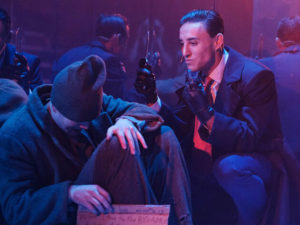The haze of sad and sorry shows could not extinguish 2019’s brightest lights, including watching Jonathan Biggins become the missing link between Paul Keating and Krapp. Decades of The Wharf Revue had demonstrated Biggins’ intelligent versatility, but in his own The Gospel According to Paul and Beckett’s Krapp’s Last Tape he had to dig much deeper, and his spade never hit rock. A near-flawless Keating impersonation in his one-man play left satire for the lusher pastures of dramatized biography. Biggins, who must be finding the stage a lonely place, also met the greater challenge of Beckett’s one-hander, affectingly realising Krapp’s pervasive prism of disappointment.

In an Ensemble revival of Red Line’s A View from the Bridge, Zoe Terakes expressed teenaged Catherine’s fretfulness by twisting her limbs around her body like a vine choking a tree, or by anxiety and confusion racing across her face like black clouds chasing grey across a stormy sky. Iain Sinclair’s bare-stage production stripped Arthur Miller’s potent play to a rawness in which Anthony Gooley’s Eddie was a wounded lion, growling dangerously as Catherine, his niece and the love and lust of his life, writhed from his grasp.
Director Simon McBurney and his Schaubuhne Berlin ensemble (who collaboratively devised the script) brilliantly preserved the disorienting essences of Stefan Zweig’s novel Beware of Pity. Just as the words were made to float on the physical acting, so the design elements wove a dreamlike surface.

National Theatre of Parramatta hosted two productions of note. Grounded, a George Brant one-hander, told of a woman who flew F-16 missions in Iraq, fell pregnant, and turned to drone-strikes in Afghanistan – a Las Vegas day job from which she returned to cosy domesticity. Emily Havea, skilfully directed by Dom Mercer, took us to the heavens, and then devastated us with her fall from impervious god to something nearer a state of grace. Anchuli Felicia King’s White Pearl executed intellectual somersaults about racism, corporate culture, animal cruelty and cosmetics. It was funny, insightful and packed with extraordinary erudition about diverse Asian slang.
Two presentations of major poems stood out. William Zappa’s adaptation of The Iliad brought us the blood and fury of war, the lies and greed of men and the fickleness of gods. Zappa, himself, chewed upon the words with relish, spat out the taunts and challenges, and savoured the beauty of the imagery, as he restored Homer’s work to its rightful place as a performance piece. Despite some flaws, the electrifying language ensured this staged reading bristled with more theatricality than many works penned purely for the stage. And Little Eggs Collective’s audacious decision to carve a play from Coleridge’s The Rime of the Ancient Mariner resulted in a production as physical and hallucinatory as it was verbal.

Chicago ruled the mainstage musicals, but Hayes Theatre again punched above its weight. Bret Easton Ellis’s 1991 novel American Psycho prophetically suggested that if greed, sexism, hedonism and narcissism went unchecked, they would spawn mutants incapable of empathy. Well, what do you know! Roberto Aguirre-Sarcasa and Duncan Sheik’s innovative adaptation made most musicals seem blunt-edged, and Alexander Berlage’s startling production starred Ben Gerrard as the psychopath whose grisly murders brought him some peace from the brutal world of mergers and acquisitions.
Caroline, or Change was just as original. What other musical has Dryer, Radio and Moon for characters? Creators Tony Kushner Jeanine Tesori’s imaginations ranged unfettered in a show where change catalysed more change, and their recurrent metaphor was the phases of the Moon, played in striking white satin before a luminous disc: an image worthy of Wilde’s Salome-hatching mind. Tesori let her music stampede across genres (from music reminiscent of Britten to that of the Supremes), eschewing all obligation to abide by song-forms.

2020
After another patchy year Belvoir is guaranteed at least one winner in 2020, having picked up the highlight of the National Theatre of Parramatta’s 2018 season: Steve Rodgers’ adaptation of Peter Goldsworthy’s novella Jesus Wants Me for a Sunbeam, starring the young Grace Truman in the unbearably sad role of Emma. Those who missed The Gospel According to Paul get a second chance at the Opera House from February 18, and you certainly don’t have to be a Keating zealot to warm to Biggins’ artistry in this piece. The months thereafter hold many intrigues, including whether or not Bell Shakespeare can bounce back from a fairly shambolic couple of years with a Peter Evans-directed production of Hamlet that stars Harriet Gordon-Anderson as the troubled prince. And given the quality of this year’s A View from the Bridge, it will be fascinating to see Bobby Cannavale and Rose Byrne turn their hands to playing Eddie and Beatrice in a Kip Williams-directed production for STC at year’s end.